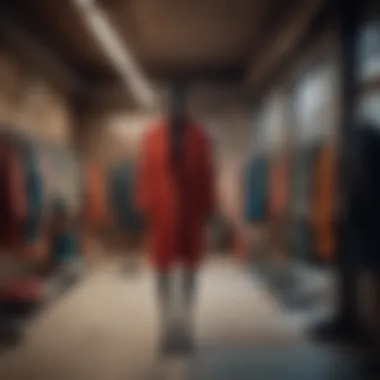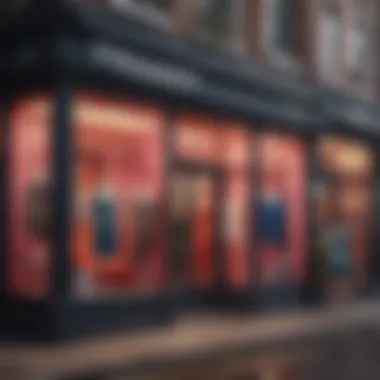The Impact of Independent Clothes Shops on Fashion


Intro
The landscape of fashion has evolved significantly in recent years, largely due to the emergence of independent clothes shops. These establishments have become essential players, creating unique space in the retail sector by offering tailored shopping experiences. This article aims to delve into the role of independent clothing boutiques, highlighting their characteristics, advantages over larger retailers, and their commitment to sustainable fashion.
With the rapid changes in consumer habits and technological advancements, understanding the dynamics around these shops is crucial. This examination not only serves to inform but also to inspire consumers and stakeholders alike to consider the value of supporting local businesses.
Key points discussed will include current trends within the independent clothing sector, sustainable practices adopted by these shops, and the challenges they face in an increasingly digital environment. By synthesizing these elements, we can appreciate the broader implications of independent clothing shops in shaping modern fashion.
Understanding Independent Clothes Shops
Independent clothes shops play a crucial role in shaping the landscape of contemporary fashion. These establishments are more than just retail spaces; they serve as cultural hubs, catering to consumers seeking uniqueness and authenticity. Understanding independent clothing retailers requires an exploration into their identity, contribution to the market, and the dynamics that set them apart from larger chain stores.
Defining Independent Clothing Retailers
Independent clothing retailers are usually small, privately owned businesses. They often emphasize personal connection with customers and curate their product lines with care. These shops specialize in unique clothing items that are not often available in mainstream retail.
The nature of independence allows these retailers to showcase locally made items or niche designs, often reflecting the creativity and style of their community. In contrast to larger retailers, independent shops are less concerned with mass production and more focused on quality and craftsmanship. This uniqueness can influence shopping experience, leading to a stronger sense of loyalty among customers.
Historical Context of Independent Shops
The history of independent clothing shops is rich and varied, evolving alongside societal changes. Historically, small textile and garment shops have existed for centuries, playing significant roles in local economies. As the fashion industry progressed into the mass production era, many independent shops struggled to maintain relevance. However, the recent resurgence of interest in sustainable and ethical consumption has revitalized their presence in the market.
Today, those who patronize independent stores often do so out of a desire to support local economies. This awareness of the historical context underscores the importance of these shops in fashion today. They resist the trends of fast fashion while promoting a more responsible approach to shopping. It is through this lens that we begin to understand their enduring relevance in an ever-changing landscape.
"Shopping at independent clothes shops is not just about buying clothes; it is about supporting an ethos that values quality, creativity, and community engagement."
Characteristics of Independent Clothes Shops
Independent clothes shops play a unique role in today's fashion landscape. They distinguish themselves through several characteristics that shape consumer perception and expectation. Understanding these traits is essential for recognizing their contribution to both the niche market of independent retailing and the broader fashion industry.
Unique Product Offerings
Independent clothing shops often curate a selection of items that is markedly different from larger retail chains. This uniqueness is not merely a by-product of limited inventory; it stems from the shop owner's vision, creativity, and deep understanding of their target market. For example, many independent shops focus on local artisans or emerging designers, providing products that cannot be found in mainstream stores. This variety reflects individual tastes and preferences, catering to consumers who seek to express their personal style.
Additionally, the offerings from these shops frequently emphasize quality over quantity. Due to their smaller scale, owners can prioritize craftsmanship and sustainable practices. Shoppers can find ethically crafted clothing made from sustainable materials, which appeals to the growing number of consumers interested in environmentally responsible choices.
Personalized Shopping Experience
A key feature of independent shops is the emphasis on personalized service. Shoppers often receive tailored recommendations, making each visit feel intimate and exclusive. Unlike big-box retailers, where sales associates may have limited knowledge of the products, independent retailers frequently have a deeper understanding of their inventory and the specific needs of their clientele. This hands-on approach fosters customer loyalty and enhances the overall shopping experience.
Consumers appreciate being treated as individuals rather than just transactions. The friendly engagement from shop owners or staff contributes to a welcoming atmosphere, encouraging shoppers to return not just for the products, but also for the relationship they build with the store. Personalized experiences can range from simple conversations to bespoke services, such as custom fittings.
Community Engagement and Support
Independent clothes shops often serve as community hubs. Their involvement extends beyond just retail; they actively participate in local events, collaborate with other businesses, and support community causes. This roots them firmly in the neighborhoods they inhabit, enhancing their reputation and attracting loyal customers.
By sourcing products locally, these shops contribute to the regional economy. This effort also creates a network of support among local artisans, fostering a sense of community and shared values. Many independent retailers host workshops, pop-up events, or themed nights that draw in locals and encourage them to explore the shop and what it offers.
Moreover, the relationship between independent shops and their customers is reciprocal. Customers are not just buyers but part of a wider community that supports the local economy and activism, thus enhancing the emotional value of shopping from these retailers.


"The soul of shopping in an independent clothes shop is often tied to the culture and spirit of the community it serves."
Advantages of Supporting Independent Shops
Supporting independent clothes shops brings several significant benefits that extend beyond mere transactions. These retailers contribute uniquely to the fashion landscape, influencing consumer behavior and reinforcing community ties. Understanding these advantages is essential for shoppers who seek to make informed choices while aligning their purchases with their values.
Quality Over Quantity
Independent clothing shops often prioritize quality over quantity in their product offerings. Unlike mass-production retailers, independent shops typically curate their selection with care. Each item is often chosen because it represents a unique style or craftsmanship. Shoppers can expect distinct materials and tailored fits, which can elevate their wardrobe far above the basics found in larger chains.
Independent brands tend to focus on creating timeless pieces, which can last longer than quickly produced fast fashion items. This focus on quality aligns well with the values of more discerning consumers. They often value durability and aesthetic longevity, which supports sustainable consumption habits.
Sustainable Fashion Practices
Sustainability is a growing concern among consumers. Independent clothing shops often adopt practices that contribute positively to the environment. These retailers may prioritize sustainable sourcing and production methods, opting for local artisans and eco-friendly materials.
Many independent shops engage in practices such as:
- Using organic fabrics that lessen chemical runoff
- Implementing ethical labor standards in production
- Focusing on lower carbon footprints due to local sourcing
Furthermore, independent shops may encourage recycling and upcycling, contributing to a circular economy. These actions appeal to consumers who are becoming more conscious about the impact of their fashion choices on the environment.
Economic Impact on Local Communities
Supporting independent shops aids local economies significantly. They often re-invest profits locally, providing jobs and strengthening the community's financial infrastructure. Studies indicate that independent retailers can help preserve unique cultural identities in towns and cities. When customers choose to shop at these establishments, they facilitate:
- Greater job opportunities within the community
- Enhanced local taxation revenues that can support public services
- A more vibrant downtown atmosphere, appealing to tourism and local business collaborations
Independent clothes shops play a crucial role in fostering a sense of community, contributing to a diverse and economically viable retail landscape. By championing these businesses, consumers not only find unique fashion choices but also actively participate in strengthening the fabric of their local economies.
Challenges Facing Independent Clothes Shops
Independent clothes shops play a unique and critical role in the fashion ecosystem, yet they encounter a multitude of challenges that test their resilience. The endurance of these shops relies not only on their unique offerings but also on their ability to navigate and adapt to various obstacles. Understanding these challenges is vital for appreciating the full spectrum of independent retailing today. Key areas of concern include competition from fast fashion, the demands brought about by digital transformation and e-commerce, and the inherent volatility in supply chains. Each of these issues presents its own set of difficulties while also offering opportunities for innovative thinking and growth.
Competition with Fast Fashion
The rise of fast fashion has drastically changed the retail landscape. Companies like Zara and H&M offer inexpensive clothing that is updated frequently, drawing consumers who seek both affordability and variety. Independent shops struggle to match the price points and quick turnaround that fast fashion brands provide. These retailers often focus on quality and uniqueness, which can be overshadowed by the sheer volume and marketing power of larger corporations.
Independent shops face a crucial choice. They can either try to compete on price, potentially sacrificing their values and quality, or they can carve out a niche by emphasizing the distinctiveness of their products. The latter approach can help them attract customers who value original designs and craftsmanship over mass-produced items. Additionally, educating consumers about the implications of their purchasing choices can foster loyalty and support for small businesses.
Digital Transformation and E-commerce
The digital evolution of retail has created a double-edged sword for independent clothes shops. On one hand, e-commerce provides a platform for widening customer reach. On the other, it introduces the complexity of digital marketing, online sales strategies, and logistics management. Many independent retailers lack the resources to develop a robust online presence, putting them at a distinct disadvantage.
To survive in this digital age, these shops must adapt to e-commerce without compromising their unique identity. This could mean utilizing platforms like Shopify or Etsy to establish an online footprint while engaging with customers through social media channels. Developing a personalized online experience can help them connect with customers, turning casual browsers into loyal supporters.
Supply Chain Volatility
Supply chain issues have come into sharper focus in recent years, with disruptions caused by various global factors impacting availability and costs. Independent clothes shops often rely on limited sources for their inventory, making them particularly vulnerable to supply chain volatility. Fluctuations in material costs, shipping delays, and changes in consumer demand can all put significant pressure on these retailers.
Addressing supply chain challenges requires independent shops to cultivate strong relationships with suppliers and consider diversifying their sourcing options. They may also benefit from adopting better inventory management practices that allow for greater flexibility in response to changing market conditions. By being proactive and adaptable, these shops can navigate through uncertainty and continue to offer distinctive products that reflect their brand ethos.


"The challenges facing independent shops assert the need for innovation and resilience. Success lies in adaptability and understanding customer needs."
The Role of Technology in Independent Retailing
In the rapidly evolving fashion industry, technology emerges as a pivotal element shaping the landscape for independent clothes shops. From marketing to customer engagement, technological advancements offer diverse tools that enhance retail experiences and bridge gaps between customers and independent brands. Traditional methods of operating have transformed, making it essential for small retailers to adopt these emerging technologies to remain relevant.
Social Media as a Marketing Tool
Social media platforms have become vital marketing avenues for independent shops. They provide an opportunity to connect directly with consumers and foster a community around the brand. By leveraging platforms like Instagram, Facebook, and Pinterest, retailers can showcase unique designs and styles, reaching a broader audience without extensive advertising budgets.
Independent retailers can also use these platforms for targeted advertising. Analytics can help identify customer demographics, allowing for more precise outreach. Furthermore, social media campaigns encourage engagement through user-generated content. This involves customers sharing their experiences with the brand, creating a sense of authenticity and community that large retailers often struggle to replicate.
E-commerce Integration
E-commerce is no longer just an option; it is a necessity for independent clothes shops. With the increasing preference for online shopping, integrating e-commerce into retail strategies can expand the customer base significantly. Retailers can create user-friendly websites or utilize platforms like Shopify and Etsy to sell their products.
An e-commerce presence allows shops to provide detailed product information, reviews, and alternative purchasing methods such as mobile payments. Additionally, a digital storefront offers the flexibility of operating outside traditional hours, attracting customers from different time zones. As more consumers prefer the ease of online shopping, having a robust e-commerce strategy is critical.
Innovative Customer Engagement Strategies
To cultivate a loyal customer base, independent shops are adopting innovative customer engagement strategies. Personalization plays a significant role here. By analyzing customer data, shops can tailor recommendations and marketing messages to individual preferences. This creates a more intimate shopping experience, resonating with consumers who seek unique and meaningful connections with brands.
Email marketing remains a powerful tool, especially when paired with segmentation techniques. By sending targeted content to specific groups, shops can ensure their messages resonate with the audience's interests. Additionally, live chat options on websites can facilitate real-time communication, addressing customer queries promptly and building trust.
In the world of retail, integrating technology is not optional but essential for survival.
Consumer Preferences and Trends
Understanding consumer preferences is crucial in evaluating the position of independent clothes shops within the fashion industry. The shifts in consumer behavior strongly influence how these stores operate and adapt.
Shift Towards Ethical Consumption
Today's consumers increasingly prioritize sustainability and ethics in their purchasing decisions. Independent clothes shops appeal to this growing demographic by emphasizing responsible sourcing and production methods. As people become more aware of the environmental and social implications of their choices, they often turn to independent retailers that align with their values. These shops typically highlight local manufacturing, organic materials, or fair trade practices, which contributes positively to their brand image.
Consumers appreciate knowing that their clothing choices support individuals and communities rather than large corporations. This shift represents a broader societal change, where ethical consumption is not merely a trend but a lifestyle choice. For independent retailers, this can create a solid competitive edge over mass-market brands.
Desire for Unique Fashion Statements
Independent clothes shops often cater to an audience that seeks individuality, moving away from the homogenous offerings provided by major retailers. Consumers are no longer satisfied just with off-the-rack clothing; they desire unique pieces that allow them to express their personality. This demand makes independent shops particularly appealing. They frequently carry limited runs or exclusive designs, enabling customers to stand out in a world where personal branding and self-expression are paramount. Through curated selections, these shops foster a sense of discovery and excitement in fashion, which is immensely attractive to consumers seeking an alternative to mainstream options.
Demand for Transparency in Sourcing
In today's market, transparency has become a critical demand from consumers. Shoppers want to know the origins of their garments, including how and where they were made. Independent clothes shops often excel in providing this information, as they typically maintain closer relationships with their suppliers and producers. The stories behind their products become part of their selling proposition.
A transparent supply chain reassures consumers that products were created in humane working conditions, using ethical practices. This openness fosters trust and loyalty, allowing independent retailers to build strong connections with their clientele. As consumers move towards educated choices, the ability for independent shops to articulate their sourcing and production practices becomes an essential aspect of their marketing and operational strategy.
"As consumers become more discerning, independent clothing shops must adapt to meet the expectations for ethical practices, uniqueness, and transparency."
Future Outlook for Independent Clothes Shops


The landscape of independent clothes shops is shifting in response to numerous external and internal factors shaping modern retail. As consumers become more aware of their purchasing power, the significance of these shops becomes increasingly evident.
Exploring the future outlook for independent clothes shops allows us to appreciate their enduring appeal and resilience. The small businesses in the fashion industry not only provide distinctive products but also foster a sense of community. They offer diverse experiences compared to their larger counterparts, which increasingly rely on automation and mass production. The future for these independent retailers hinges on adaptation, resilience, and global connectivity.
Adapting to New Market Realities
Adapting to new market realities is crucial for independent clothes shops. Market fluctuations and evolving consumer preferences demand a flexible approach. Retailers must stay informed about trends and listen to their customers. An example includes incorporating seasonal shifts and adapting product lines accordingly.
Furthermore, these shops can utilize data analytics to understand purchasing habits. Through this insight, they can enhance inventory management, reducing waste and improving profitability. More importantly, it allows independent shops to curate collections that resonate more strongly with their clientele.
The rise of sustainable and ethical fashion has also redefined shopping behaviors. Consumers are increasingly inclined toward brands that demonstrate a commitment to environmental and social responsibility. Independent shops can exploit this trend by emphasizing their unique sourcing practices, limited production runs, and ethical guidelines. Keeping an authentic narrative around these points can foster customer loyalty and propel sales.
Building Resilient Business Models
Building resilient business models is essential in order to thrive in a competitive environment. Independent clothes shops must design strategies that cater not only to current trends but to unforeseen challenges as well. One aspect of resilience is diversifying sales channels. Many independent shops successfully combine physical storefronts with online platforms.
Moreover, developing strong relationships with local suppliers can create a sustainable network that helps mitigate supply chain disruptions. By working closely with manufacturers, independent shops can ensure quality control and timely deliveries. This agility is not just beneficial for meeting immediate needs; it also enhances brand reputation.
Adapting financial strategies to ensure sustainability amidst fluctuations is equally important. Considering alternative financing options or crowdfunding methods for new projects can protect businesses against cash flow challenges. Being proactive in these areas secures peace of mind.
Expanding Global Perspectives
Expanding global perspectives allows independent clothes shops to explore new opportunities. Geographical limitations can stifle growth. By leveraging e-commerce platforms, independent retailers can reach customers worldwide. Online visibility offers extensive potential, enabling them to share their unique style and vision with a broader audience.
Moreover, participating in international fashion fairs and trade shows can cultivate valuable connections and collaborations with diverse brands. These collaborations can lead to innovative designs and fresh ideas, enriching the overall shopping experience.
To thrive internationally, independent shops must also engage with cultural trends and client needs across different regions. They should adapt marketing strategies and product assortments that resonate with distinct audiences.
The adaptability of independent shops is pivotal to their success in a rapidly transforming industry. By remaining agile, they can redefine their roles and flourish amidst challenges.
Independent clothing stores are not just retailers but also trendsetters and community hubs. Their ability to evolve continuously will secure their future, as they hold a vital piece of the fashion puzzle.
Case Studies of Successful Independent Shops
Exploring case studies of successful independent clothes shops offers valuable insights into how these retailers navigate the complex landscape of modern fashion. Such examples demonstrate the efficacy of unique business models, loyal customer bases, and effective community engagement. When we look at these case studies, we can identify established trends and strategies that other independent shops might replicate. These narratives shed light on the creativity and resilience that define successful independent retailers today.
Local Success Stories
Local success stories serve as powerful testimonies to the potential of independent clothing retailers. For instance, boutiques such as A|X Martin Margiela in Nashville have thrived by focusing on curated selections that cater to their demographic. They engage their community through events and collaborations with local artists, creating a loyal customer base that values both fashion and local culture. This store exemplifies how a strong identity and community connection can lead to sustainable growth.
Additionally, stores like We Are Cow in London have embraced sustainability by offering second-hand and vintage clothing. Their model aligns with consumer desires for uniqueness and eco-conscious choices. This combination of ethical practices and individualistic style has resonated with local customers, leading to solid financial health and an exemplary business model for others to learn from.
Innovative Brands Redefining Retail
Innovation is at the core of many successful independent clothing shops. Brands such as Reformation stand apart by not only offering stylish clothing but also integrating transparency in their production processes. This approach appeals to a growing consumer base that prioritizes ethical buying choices. Use of technology in their marketing strategies has amplified their visibility and consumer engagement.
Moreover, the company MUD Jeans offers a distinct concept with their lease-a-jean model. By allowing customers to rent jeans rather than purchase outright, they promote sustainable fashion practices while keeping the consumer engaged. This kind of innovative thinking in business models can redefine the retail landscape for independent shops.
Collaborative Networks among Independent Retailers
Collaboration is another strategic approach seen in successful independent shops. Networks such as the Indie Retail Collective in the UK exemplify how sharing resources can elevate all members of the group. Through collective branding strategies, joint events, and shared digital platforms, independent retailers can enhance their market presence while reducing costs.
Partnerships can range from shared pop-up shops to district-wide marketing campaigns that showcase the benefits of supporting local businesses. As these retailers collaborate, they create a stronger community presence, allowing them to compete effectively against larger retail chains.
Successful independent shops thrive when they leverage community connections, innovate in their business models, and engage in collaborative efforts with other retailers.
In summary, the case studies of successful independent shops highlight various strategies that promote resilience and adaptability. These insights not only attract attention but also serve as a blueprint for other independent retailers aiming to carve out their niche in the competitive world of fashion.



